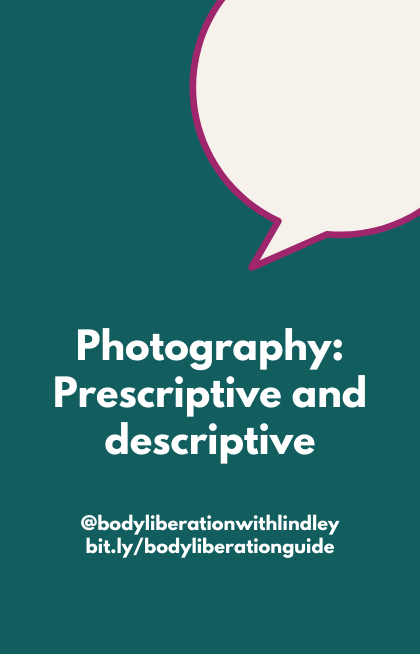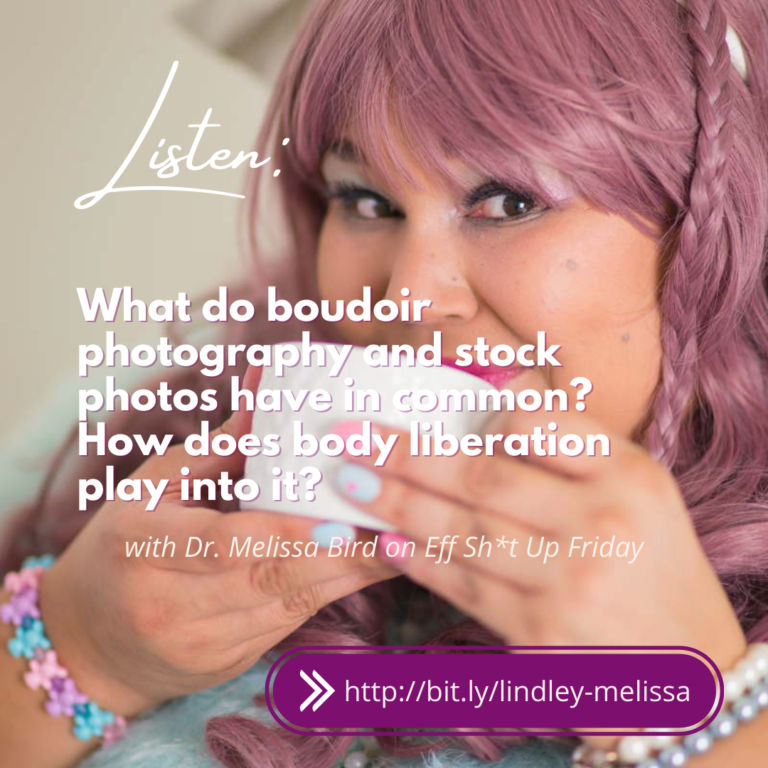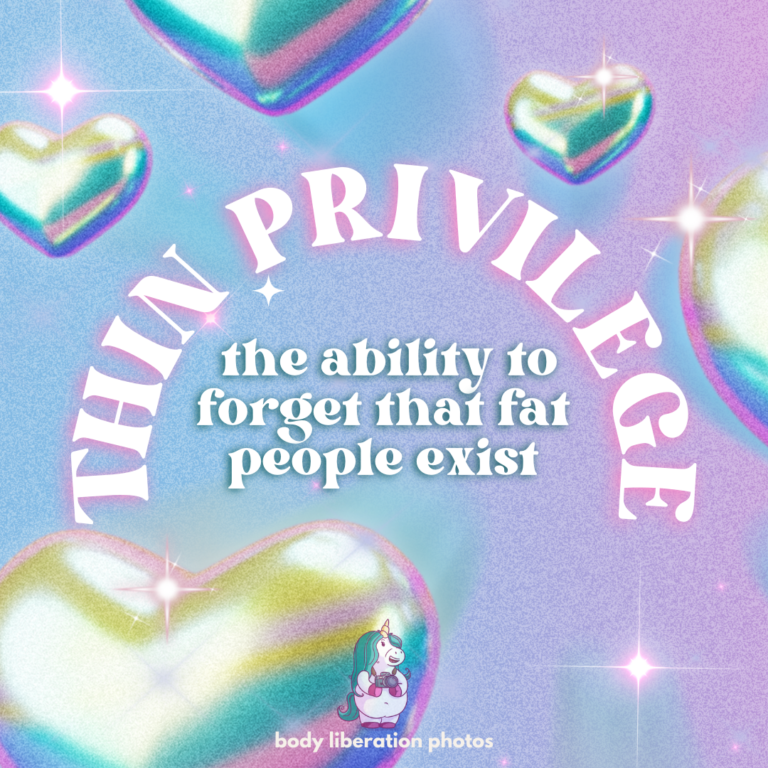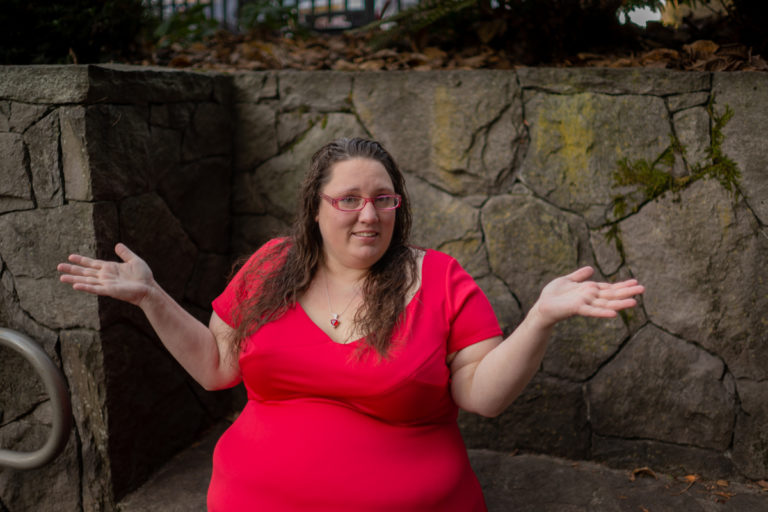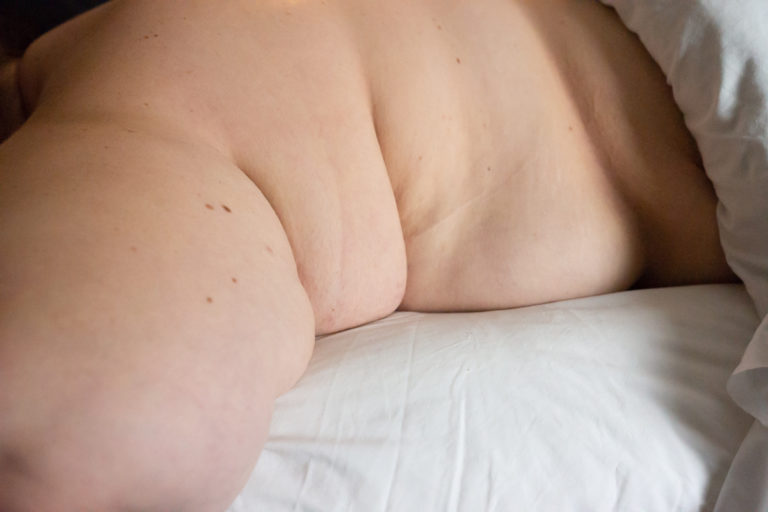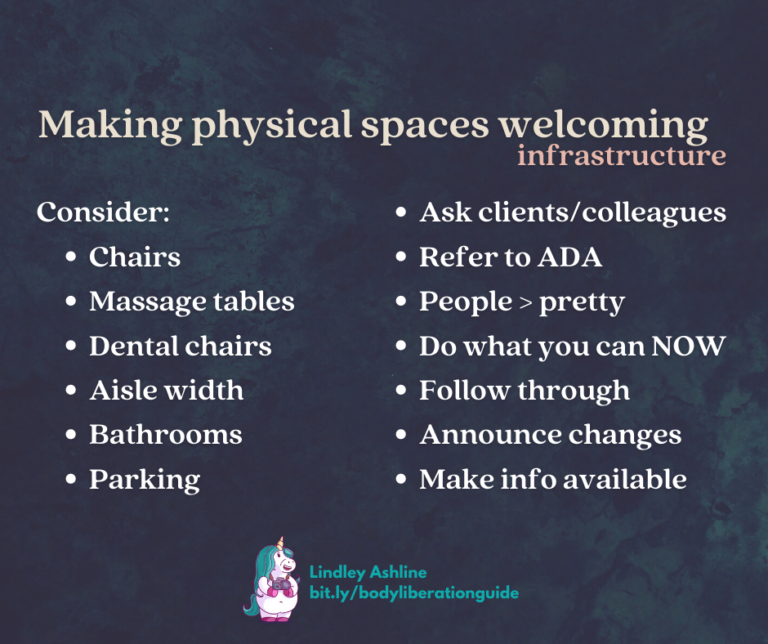Health at Every Size®, Stories and Silence
It’s been an interesting week or so since Mikey Mercedes and I went public.
In the time since, there’s been a lot of excellent discussion in marginalized communities.
In the Health at Every Size®-aligned healthcare provider groups to which I have access or connections, there’s been a silence that echoes almost as loudly as the thousand cookie-cutter disavowals of Lindo Bacon that have gone up all over Instagram and Twitter.
Based on long acquaintance with these provider communities, I’m observing a split in the way their members interact with HAES that explains the silence in private spaces.
There are plenty of providers who are sincere in their desire to interrogate their internalized fatphobia and carry out not only the bare minimum of HAES care, but the spirit of it as well — with all its social justice implications.
From my point of view, Health at Every Size (HAES) has done WAY more to harm and delay fat liberation than it has ever done to help it
— Mean Fat Girl- 🏳️🌈💄 (@Artists_Ali) March 17, 2022
The silence
But it seems that the vast majority of providers and clinicians who claim to be HAES-aligned in their healthcare practice are casual about it to the point that they haven’t read any of the books or research, and are unaware of (or not bought into) its social justice foundations.
To be blunt, they seem to think that equality for fat people is a nice idea and a good marketing angle for their business, and that’s as far as it goes.
So when they’re challenged as individuals, or people they like are challenged, for hurting fat and/or Black and/or BIPOC people, their immediate response is to get defensive and angry because they have no foundation for processing it or doing better.
After all, aren’t they trying to help these ungrateful fatties?
When big events like this happen, that lack of a foundation means that these providers simply vanish. They’re not willing to grapple with it, in part because they genuinely think it’s not their place and in part because they simply don’t have to to maintain their businesses.
There’s a real feeling that creating a better movement and pursuing justice is simply someone else’s problem, and that if the fat people want it, then they can just get cracking and do the work themselves.
The fact that this is in and of itself oppressive doesn’t occur to them, and when it’s pointed out they shriek and run away.
For these providers, silence is a win-win scenario for them personally. And if fat people are getting hurt? Not their problem.
Do HAES people know or CARE that they dumped a significant amount of the scorn for their extremely limited framework
— Mean Fat Girl- 🏳️🌈💄 (@Artists_Ali) March 17, 2022
in the laps of the FAT LIBERATIONISTS they stole it all from in the first place??
Like talk about fucking INSULT TO INJURY
Talk amongst yourselves
There have been dozens of “I stand with Mikey, Lindley and ASDAH” posts going up, primarily on Instagram. That’s great! Support is good!
But there’s been no discussion that I’ve seen among providers. Y’all aren’t gathering to work through this and improve, you’re just doing the minimum and going about your week.
That individualization is part of what’s gone wrong with HAES. If you can’t connect as a community, you can’t offer support as a community, or check in with or call in your colleagues, or grow or improve.
You’re not a community or a movement at all, just yet another cutthroat industry taking advantage of marginalized groups for a buck. And given the justice-oriented origins of HAES, that’s extra cynical.
I’ve considered posting in some provider groups and offering to facilitate these conversations, but you know what? Nah. I’m not doing yet more labor for HAES for free, and if I charge for it, I’ll just be seen as taking advantage of the situation. Y’all can either talk amongst yourselves, or not.
The Lindo Bacon roll out of HAES was an utter shit show that made fatphobia WORSE for fat activists
— Mean Fat Girl- 🏳️🌈💄 (@Artists_Ali) March 17, 2022
HAES people have had over a decade to GIVE A SHIT ABOUT THAT
THEY DID NOT
Silence is…something
I want to address a couple of silence tropes that come up a lot when fat folks talk about our marginalization.
One is the fear that thin people have of saying or doing the wrong thing, so they don’t do anything at all.
This is privilege in action, because no matter what fat folks do, there will be people chomping at the bit to tell us how we’re wrong and bad.
Risk is a part of life, and if you’re not prepared to take even the smallest risk on behalf of people who are less privileged than you are or who are marginalized in a different way, then you need to stop claiming to be HAES-aligned.
I really want to believe that it was coincidence and opportunism
— Mean Fat Girl- 🏳️🌈💄 (@Artists_Ali) March 17, 2022
that HAES contributed GREATLY to the levels of harassment that functionally emptied out fat activism online spaces
Just in time for thin people to take over and NEVER address fatphobia in a meaningful way
Wait, wait, don’t tell me
Another type of silence is what I’ve been calling the Don’t Rush Me.
When asked for a response (directly, or when it’s even slightly implied in their presence), some providers will state that they need time to think it over. And that’s fine on the surface of it; we’re all busy people.
Some providers will genuinely use this time for introspection. Others are just waiting out the clock.
Because if everyone’s moved on by the time you’re ready to speak, well, you can just move along with them and avoid any risk, right?
All of this was done in such a way that me as a fat activist and someone within fat community
— Mean Fat Girl- 🏳️🌈💄 (@Artists_Ali) March 17, 2022
did not have access to the inner workings of in any way
it has not been transparent to me or answerable to me in any way
but I am held responsible for these opaque decisions
There’s a lot of daylight between silence and centering
The last is when thin people claim that they don’t want to speak up in support of fat people because they don’t want to center themselves.
This is pretty transparently ridiculous, because adding a comment or post in support of someone else is pretty easy to do without centering yourself.
If you have found in the past that you’re getting accused of centering yourself when you’re trying to support someone else, then you may want to seek some knowledgeable (compensated) advice on what you’re doing that makes it appear that you’re prioritizing yourself over the person you’re trying to support.
Like OF COURSE there are secret listserves where this is all discussed away from the Random Trash like me
— Mean Fat Girl- 🏳️🌈💄 (@Artists_Ali) March 17, 2022
Of COURSE there are
There ALWAYS are
What happens in Stories stays in Stories
For the first few days, HAES providers as a group hung back, letting fat and Black people take the risks of sharing and boosting our posts.
Then a few providers posted, and a few more, and suddenly almost everyone was posting with very similar “safe” wording.
It’s been fascinating to watch.
The bigger the following, the slower the response. As someone with a small, but significant, following myself, I understand wanting to think through your words and actions carefully before posting. It’s so easy to do more damage when you have a large audience.
But some of these folks with huge platforms seem like they’d rather just wait in the hopes that this will all blow over and they won’t have to say anything.
Some have already faffed off into the sunset after building their careers, platforms, podcasts and book deals on the backs of marginalized people, leaving their social media accounts to languish and ignoring calls for a response.
A few have gone full anti-“cancel culture” and are making fools of themselves.
And some (according to comments they’ve made elsewhere) don’t see anything wrong with Lindo’s words or actions, but are too cowardly to risk saying so in public.
Do you know how many organisations have told me they’d love to have me speak at a conference but they’ve already paid for a guest speaker so I’d have to do it for free? And every single time thay guest speaker was a Lindo Bacon equivalent. Thin, white, and profiting off my misery
— FatdoctorUK🏳️⚧️🏳️🌈🩺 (@thefatdoctoruk) March 18, 2022
This concept of risk is why it’s fascinating to watch the responses.
The small accounts, who have little to lose, are making permanent posts in their actual Instagram feeds.
Others, especially large accounts, are only posting in their Instagram Stories. (For readers from the future, Stories disappear after 24 hours unless the account owner chooses to “pin” them to their account.)
When you only post in Stories, you can say you’ve done something — without messing up the way your grid looks or anyone being able to find it later. All the benefit, none of the risk.
Don’t get me wrong: a public statement is better than none, and some providers have been putting their actions and money where their mouths are. I know of at least one person who’s arranging provider-led discussions about this, and several who are agitating in their provider circles where there’s no fat presence.
To those folks: I see you. You’re doing fine, and I appreciate you.
I feel like fat activists were essentially shoved to the side by a group of thin people
— Mean Fat Girl- 🏳️🌈💄 (@Artists_Ali) March 17, 2022
who swore they were working within a fatphobic system FOR fat people and that we should trust them
we have gotten nothing but empty platitudes when those people bother to remember we exist
Mean, ungrateful fat people
What you need to understand is that this isn’t the first time HAES has had issues with racism and fatphobia. Lindo’s words and actions didn’t spring fully formed from nowhere.
That also means that HAES has a long track record of handling these issues…or not.
When a fat person objects to something in a HAES context, it’s treated as if it were inappropriate, or unseemly, or uncouth.
(In this particular instance, we see it in the dozens of comments left across social media platforms accusing us, but especially Mikey, who is Black, of being inappropriate and cruel by talking about Lindo’s words and actions in public.)
When fat people object to poor treatment within HAES or by HAES providers, all the stereotypes and stigma around fatness kick in, and go unquestioned as thin providers simply back away from what to them probably seems like an unpleasant and unnecessary scene.
And for fat people who are also Black, Indigenous or other people of color (BIPOC), the racist stereotypes associated with their particular heritage get piled on top.
Since it only takes one instance of objecting to fatphobia — even if we manage to somehow object in a “perfect” way — to be labeled needy, loud, a troublemaker, rude, exaggerating, a liar or mean, it increases the power imbalance within HAES and perpetuates weight stigma.
Did -anyone- involved care about what this did to the fat activism community
— Mean Fat Girl- 🏳️🌈💄 (@Artists_Ali) March 17, 2022
If they did, you absolutely could not tell by me
Let’s talk about power for a moment
HAES also has a power imbalance problem. Providers and clinicians who claim HAES alignment are primarily thin white women.
Fat people, especially very fat people, are mostly excluded from both the educational spaces needed to become a healthcare provider in the first place, and HAES professional spaces.
This results in a context of thin white providers who are accorded immense respect (due to their status as healthcare providers, in addition to thin, white, well-educated privilege) and considered experts no matter whether they’ve even read the basic HAES materials.
Everyone else becomes a supplicant, approaching these providers with respect and humility, hoping to get the healthcare they need.
This does not exactly set the stage for a healthy movement or community. (Pun intended.)
Why have I not being saying stuff all along?
— Mean Fat Girl- 🏳️🌈💄 (@Artists_Ali) March 17, 2022
I assumed no one would care
Because for years no one outside of hardcore fat liberation ever did
And because I have said things and gotten nothing but more grief from all sides
Where do we go from here?
The inaccessibility of medical school, healthcare provider careers, provider spaces and HAES-aligned community spaces to fat people isn’t a problem we can solve overnight.
I have a couple of ideas, though these are not fully-fledged recommendations and are more just me thinking out loud. I’m sure there are implications to each that I haven’t thought through yet, so don’t come at me about it.
This is also your regular reminder that it’s not the job of oppressed people to fix their oppression.
That said, my first thought is that you — thin, white healthcare providers — need to work on your racism problem. Anti-fatness is anti-Blackness.
Two places to start are Fearing the Black Body and Belly of the Beast. I know, books are long and you’re busy. But while you’re busy with your career and life, fat and Black people are busy with all that and with trying not to die. Make time.
I also think that a sea change could genuinely be produced by every person in an average-sized or thin body who uses or claims HAES in any way in their career being very honest with themselves about the way they:
- Interact with their thin colleagues
- Stay silent when they see fatphobic nonsense from those same colleagues
And changing whatever needs to change in their lives so that they stop enabling thin abusers and missing stairs, and start speaking up when they see fatphobia happening.
Even if it risks alienating a fellow thin person.
If you want the rewards of HAES, it’s time to start sharing in the risks.
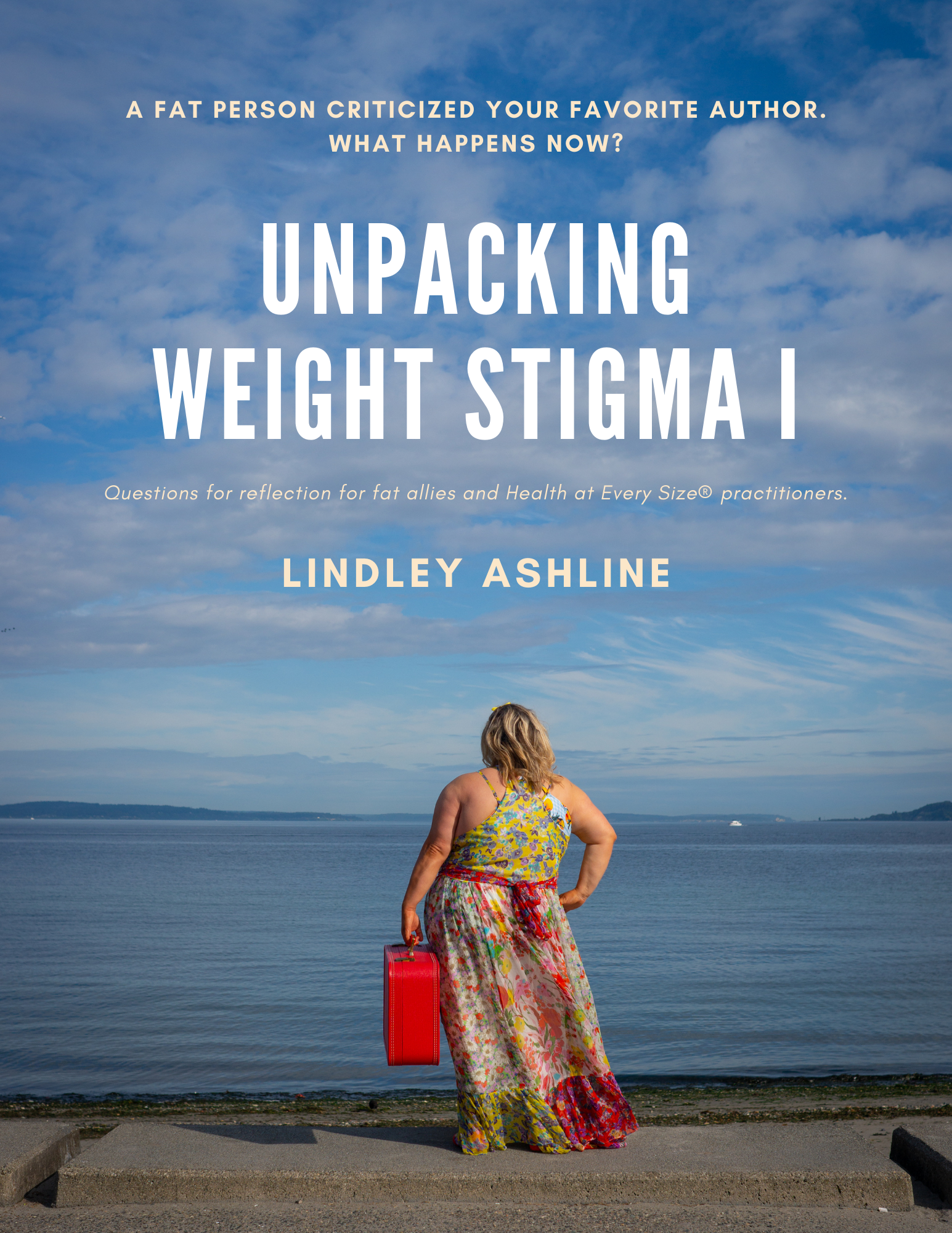
Unpacking Weight Stigma I: A Workbook for Fat Allies and Health at Every Size® Practitioners
Hi there! I'm Lindley. I create artwork that celebrates the unique beauty of bodies that fall outside conventional "beauty" standards at Body Liberation Photography. I'm also the creator of Body Liberation Stock and the Body Love Shop, a curated central resource for body-friendly artwork and products. Find all my work here at bodyliberationphotos.com.



